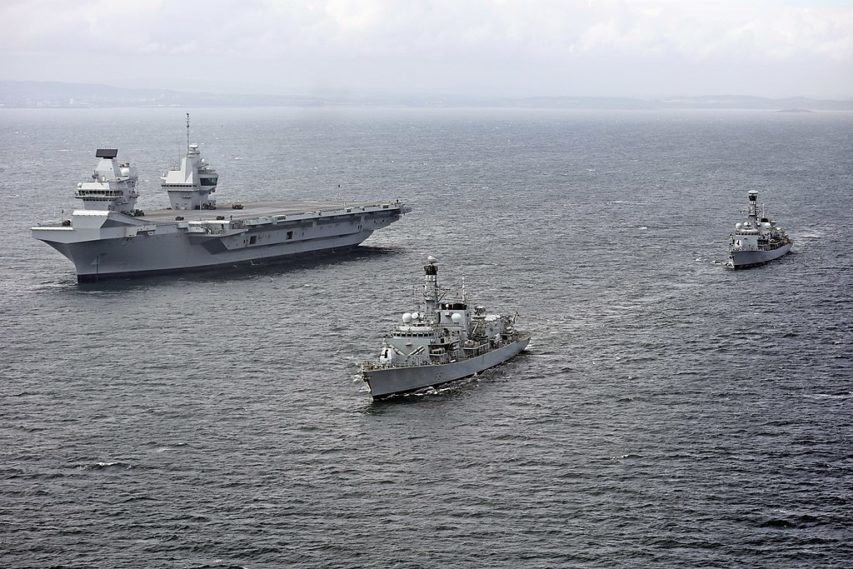At the Thin Pinstriped Line, Sir Humphrey explains to “Disgusted of Tunbridge Wells” and all the other would-be Admirals of the Fleet why having a non-RN escort for Britain’s newest aircraft carrier is hardly a bad thing:

Aerial view of HMS Queen Elizabeth with Type 23 frigates HMS Iron Duke (centre) and HMS Sutherland (right) in June 2017 off the coast of Scotland.
Photo by MOD via Wikimedia Commons.
The United Kingdom has few allies closer than the Netherlands. Both nations are modern, outward looking and instinctively maritime in their view of the world. Long standing NATO partners and with significant experience of working together across the globe, the Netherlands Armed Forces are highly respected as being capable, well equipped and staffed with first rate personnel.
The relationship between the RN and the Royal Netherlands Navy is extremely close, particularly between the Marine Corps and the Submarine Services. It is therefore extremely pleasing to hear that the Netherlands will be deploying a warship to form part of the inaugural ‘Carrier Strike Group’ (CSG) deployments for HMS Queen Elizabeth in 2021 HERE. This is a significant announcement and it has several ramifications that are good news for the Royal Navy.
[…]
There seems to be an exceptionally British trait of moaning at good news. Some people felt that it wasn’t good enough for the RN to be ‘reliant’ on a foreign warship operating as part of the CSG, and that the UK should be going it alone. What utter rot.
It does not mean, despite what some naysayers were desperate to bleat about on social media without any evidence to the contrary, that defence cuts mean the UK is reliant on the Dutch to protect the carrier. The RN has spent a lot of time working out what escorts are needed and ensuring they will be available when necessary as part of the CSG to properly protect the carrier. Any foreign participation is a nice bonus capability to have, not a tacit hint that the RN is short of ships.
The reality of future operations is that the UK is going to operate as part of an international coalition with our friends and allies. Despite the fantasies of some, desperate to see a huge purely British task force sailing around the world looking for a fight and a free trade deal, the fact is that any future military operation is going to be international by design.
Working with allies is critically important but isn’t something you can just do at the drop of a hat. One of the reasons why NATO works so well is because it has spent 70 years investing in common processes, tactics and procedures and exercising them regularly to ensure everyone can work together coherently.
Integrating a Dutch vessel now is vital because it helps build and cement an understanding at operational level of how to work with each other, to learn the capabilities of each other’s ships and how to work them to best effect together. It can also spot unintended issues or problems and help work out how to fix them quickly. This takes time to do, so it is likely that any Dutch vessel assigned in 2021 will have spent a considerable period working up in advance before beginning the deployment proper.
For those who complain that the Royal Navy hasn’t got enough ships to escort the carrier, it is worth reflecting that the Netherlands have a total of 6 frigates. Assuming the normal serviceability rates for escorts apply, then two are likely to be in refit and another in maintenance or training. This leaves just three active vessels at any one time – so in reality, the Netherlands commitment to support the Carrier Strike Group represents them committing a third of their available escort force for a significant amount of time.



